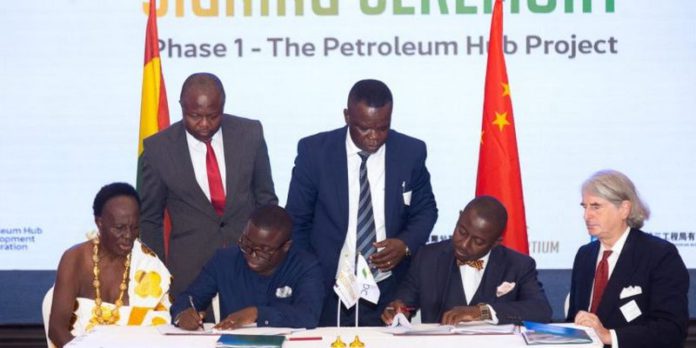
In a move to transform Ghana’s energy sector, the Government of Ghana has signed a US$12 billion agreement with the TCP-UIC Consortium.
This consortium includes Touchstone Capital Group Holdings Ltd., UIC Energy Ghana Ltd., China Wuhan Engineering Co. Ltd., and China Construction Third Engineering Bureau Co. Ltd.
The agreement is for the development of the first phase of the Petroleum Hub project in the Jomoro Municipal Area in the Western Region.
This project aims to position Ghana as a key destination for energy trading in the West Africa sub-region.
It is a critical step towards the President’s vision of Ghana becoming a regional hub for petroleum refining, storage, and distribution.
The Petroleum Hub project is expected to accelerate the growth of Ghana’s petroleum downstream sub-sector, making it a significant player in the economy. It will create jobs, attract foreign direct investment, and enhance energy security.
Comprehensive Development Plan
Covering over 20,000 acres of land in the Jomoro Municipal Area in the Western Region, the Petroleum Hub which is private sector-led will secure investments and development of key, ancillary and other infrastructures.
The key infrastructure includes three (3) refineries, five (5) petrochemical plants, 10 million cubic metre storage facilities, Jetties and Port Infrastructure.
The ancillary infrastructure and services include a power plant, rail and road network, Liquified Natural Gas (LNG) terminals, pipelines, water treatment facilities, repairs & maintenance services, nautical services, waste treatment facilities, logistics, security & emergency response centre, residential & commercial facilities, light to medium industrial area and recreational centres.
Other services and infrastructure such as a state-of-the-art laboratory for petroleum products, fabrication workshop, metering and calibration services, equipment supplies, logistics services, remote monitoring & diagnostics, lubricant storage & supply, and inspection & certification services will also be available.
The project is estimated to cost about US$60 billion.
The development of the Petroleum Hub project will be executed in 3 phases, between 2024 and 2036, with the first phase focusing on developing a 300,000 barrel per day (bpd) refinery, 90,000 bpd petrochemical plant, 3 million m3 storage facility, Jetty and Port Infrastructure.
Economic Impact
The Petroleum Hub project when completed is expected to improve Ghana’s economy significantly.
The Petroleum Hub project will increase the presence of major international oil trading and storage companies, create regional trading champions and encourage joint ventures between local and international companies for knowledge transfer and wealth creation, etc.
The local entrepreneurs will have the opportunity to do business with foreign investors in the Petroleum Hub which will facilitate the financial growth of these enterprises.
The Petroleum Hub project is expected to transform Ghana’s economy and create over 780,000 direct and indirect jobs by 2036.
Sustainability Approach
Recognizing the importance of sustainable development, the Petroleum Hub Development Corporation (PHDC) incorporates comprehensive sustainability plans.
In line with Ghana’s Energy Transition Plan, the PHDC has outlined its sustainability plan with two key pillars;
Pillar 1 is balancing the economic environmental and social considerations and Pillar 2 is the empowerment of people through local content maximization and gender integration.
The Corporation recognizes that the core activities in the Hub will require carbon offsetting mechanisms to limit our contributions to Green greenhouse gas (GHG) emissions.
Key initiatives that are to be executed include the development of a live wall along the boundary of the hub, the adoption of advanced technologies for emission control and waste management.
The Corporation is focused on ensuring and safeguarding the biodiversity in the hub area, protecting the existing natural resources, and ensuring adequate waste management practices.
Additionally, community engagement initiatives will ensure that the local population benefit from improved infrastructure, healthcare, and educational opportunities.
Strategic Partnerships
The signing of this agreement hinges on the robust partnerships established between the Ghanaian government and international stakeholders.
TCP-UIC Consortium brings a wealth of expertise and technology to the table, ensuring that the project meets the highest standards of operational excellence and safety.
Conclusion
The signing of the US$12 billion agreement is more than just a financial transaction; it is a bold step towards economic sovereignty and regional leadership in the petroleum industry.
With the combined efforts of the government, industry partners, and the people of Ghana, the petroleum hub is poised to become a cornerstone of the nation’s economic landscape.
About PHDC
The Petroleum Hub Development Corporation was established in 2020 through an Act of Parliament, Act 1053 (Petroleum Hub Development Corporation Act, 2020) to drive the promotion and development of the Hub in terms of securing licences, permits and other required government support.
The Corporation was set up to create an enabling environment for private sector investments to thrive, provide decent jobs for Ghanaians and avenues for the growth of indigenous businesses.
GES Director-General offers scholarship to Juaso SHTS best student
